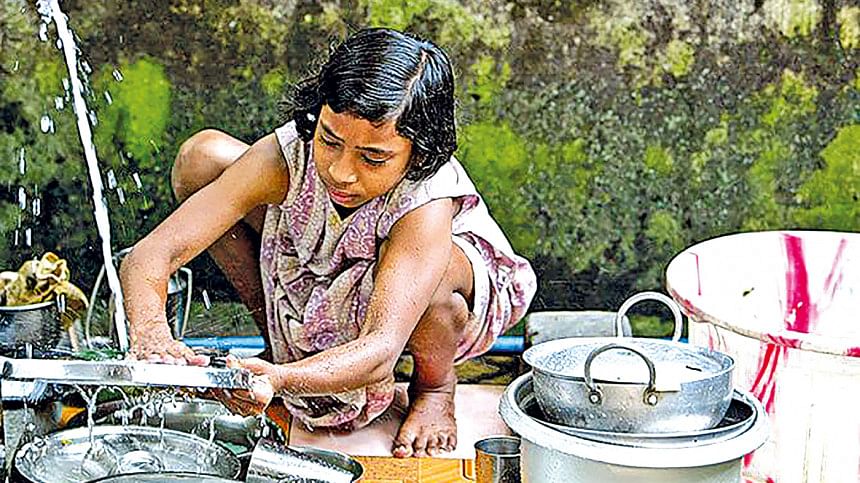Upholding the human rights of domestic workers

Among others, one of the driving principles behind the liberation of Bangladesh was to establish a country free from discrimination and exploitation on the basis of race, religion, sex, colour etc. The provisions embodied in the Constitution reflect this vision through its provisions on fundamental rights and by providing redress to court for protection of fundamental rights.
The Constitution, under Article 34, provides that all forms of forced labour are prohibited. While the Constitution does not provide the definition of the term forced labour; Article 2 of the Forced Labour Convention, 1930 defines forced or compulsory labour as all work or service which is exacted from any person under the menace of any penalty and for which the said person has not offered himself voluntarily. Forced labour is involved when a man is obliged to work at wages below the minimum wage (Sanjit vs Rajasthan AIR 1983 SC 328). Employing labour for a remuneration less than the statutory minimum wages exploiting the hunger and poverty of worker may also be considered as forced labour (People's Union vs India AIR 1982 SC 1473). However, because of poverty, children on this sub-continent are still required to work rather than finish their education, especially female adolescents who are employed as domestic servants or almost anything else because of their circumstances. Forced labour can be practiced in the domestic work sector if there lacks proper legal framework.
According to the Domestic Workers Protection and Welfare Policy, 2015 domestic work refers to assisting in cooking and cooking related ancillary work, shopping, keeping the courtyard or courtyard of the house clean, and other household chores that are generally considered household chores.
For regulating the relationship between workers and employers, rights and duties of both parties and for regulating the child labour, Bangladesh has a special law titled as the Labour Act, 2006. Child labour is forbidden by Section 34 of the Act. Sections 100 and 108 specify that a labourer's daily working hours should not exceed 8 hours and 10 hours, including overtime, respectively. Other chapters of the aforementioned Act deal with welfare measures, provisions for health, hygiene, and safety, wages and payment, trade unions, their participation in company earnings, provident funds, and so on. Unfortunately, section 1 of the Act expressly excludes domestic workers from its coverage. As a result, domestic workers, including domestic child workers, have no rights under this Act.
According to the Domestic Workers Protection and Welfare Policy, 2015 domestic work refers to assisting in cooking and cooking related ancillary work, shopping, keeping the courtyard clean, and other household chores that are generally considered household chores. A domestic worker is a person who performs household chores in the employer's house, either verbally or in writing, on a part-time or full-time employment basis.
According to the Domestic Workers Protection and Welfare Policy, 2015, no children under the age of 12 can be employed as domestic workers in any household, and child domestic workers cannot be engaged in heavy or risky work. But none of these provisions are being fully applied. The 2015 policy simply provides some guidelines that are not legally binding. Domestic child workers in Bangladesh are frequently subjected to physical and mental abuse. There is no direct and explicit statute providing legal mechanisms for domestic employees' rights and welfare, let alone domestic child workers.
By exempting domestic workers from the application of the Labour Act of 2006, they are denied the legal right to organise a labour union, to demand and negotiate with their employers about their working hours, salaries, leave, and so on. This undermines their constitutional right to freedom of association. Furthermore, the lack of express regulation for them provides the employer the power to treat them in the manner as they deem fit, infringing their fundamental right to be treated only in accordance with the law under Article 31.
Domestic workers are one of Bangladesh's most neglected and impoverished populations. They are frequently looked down upon, mistreated, abused, and neglected by legislation, with their job classified as "informal" in labour statistics and in terms of obtaining social rights. The High Court Division held that it is high time that the work done in the domestic sector is recognised as such and the rights of these workers ensured by including the workers of the domestic sector within the definition of 'worker' in the Labour Act, 2006 (BNWLA vs The Cabinet Division, 31 BLD 265). For upholding the Constitutional rights of the domestic workers, it is necessary that they should be included in the Labour Act, 2006
The writer is an LLM candidate at the University of Dhaka.

 For all latest news, follow The Daily Star's Google News channel.
For all latest news, follow The Daily Star's Google News channel. 



Comments